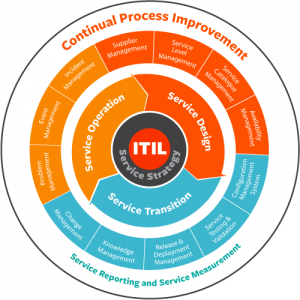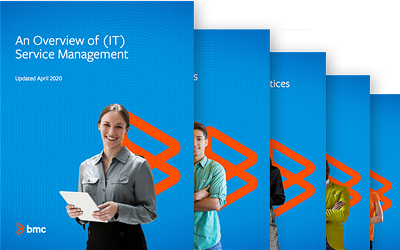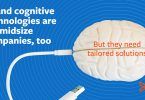New for 2019: Access the ITIL 4 Guide on BMC Blogs ›
Most organizations consider their people, capabilities, processes, and technologies to be strategic assets. These assets help deliver and support the company’s vision and mission. Efficient and effective alignment of capabilities and resources of services and products can help create a strategic advantage in the markets that organizations serve. This is where ITIL®, the Information Technology Infrastructure Library, comes into play. ITIL is the most widely accepted approach to IT service management in the world. It helps individuals and organizations use IT to realize business change, transformation and growth.

The ultimate goal of ITIL is to improve how IT delivers and supports valued business services. ITIL is not just technology management or process management. It also focuses on improving the capabilities of people, processes, and technology. ITIL provides value for an organization, its resources and capabilities, including employees and customers.
Adoption of the ITIL framework can be the foundation for success of other initiatives such as DevOps, cybersecurity, cyber-resilience, Internet of Things (IoT), and other emerging trends and technologies.
Download Now: ITIL 4 Best Practice e-Books
These all-new for 2020 ITIL e-books highlight important elements of ITIL 4 best practices. Quickly understand key changes and actionable concepts, written by ITIL 4 contributors.
How to use this guide
This online guide presents the following:
- Overview of the principles of ITIL
- Advantages of adopting the ITIL framework
- Descriptions of each ITIL stage
- Links to useful resources for further learning
As you page through this online guide, you’ll have opportunities to read blog posts associated with ITIL, learn about BMC ITIL-compliant solutions, download free ITIL best practice books, visit the ITIL and CMDB community, and sign up for ITIL Certification and Training. Check back often to keep up with the latest ITIL information available from BMC.
ITIL Processes from ITIL V3 2011
The guide covers the following processes:
- ITIL Service Strategy ›
- ITIL Service Design ›
- ITIL Service Transition ›
- ITIL Service Operation ›
- Continual Service Improvement ›
What is ITIL?
ITIL is a set of IT Service Management practices that focuses on aligning IT services with the needs of business.
Every organization delivers a service or product. For every service or product, the ITIL framework helps manage delivery, industrialization, support, and consumerization from inception to retirement. The five stages of the ITIL framework include:
- Service Strategy
- Service Design
- Service Transition
- Service Operation
- Continual Service Improvement
Each stage in this service lifecycle supports all the other stages.
ITIL does not tell any particular organization all the capabilities that it needs. But for any IT organization making roadmap decisions it gives practical guidance on strategy and services.
ITIL also complements other industry best practices. For example, if an organization also needs guidance for project management, then that organization can augment the ITIL framework foundation with a project management best practice.
Who uses ITIL?
Large, medium, and small organizations all over the world use ITIL to help them improve the value of their services. ITIL helps organizations in all industries and sectors solve business issues as well as improving IT capability. Organizations use ITIL as a guide to improve or implement a capability that provides business value.
Since ITIL is a set of best practices and not a standard, organizations are free to adopt as much of the ITIL framework as they see fit.
What are the benefits and advantages of ITIL?
Organizational benefits of adopting ITIL best practices include:
- Stronger alignment between IT and the business
- Improved service delivery and customer satisfaction
- Reduced costs through improved use of resources
- Greater visibility of IT costs and assets
- Better management of business risk and service disruption or failure
- More stable service environment to support constant business change
More detailed benefits and advantages of the ITIL framework are documented in each of the stages and in the 26 ITIL process areas defined in the core books. Essentially, the benefit lies in aligning process area with desired business outcome. The goal is to improve the specialized capability of the process, people, suppliers and technology which supports the business service.
Video: How To Embrace ITIL as an Organization
BMC Education Services presents: How To Embrace ITIL as an Organization with Heather Applegate. (12:10)
Why BMC?
BMC builds ITIL-compliant solutions and supports those solutions with ITIL training, services, and resources. Our Centers of Excellence and industry-leading technologies help organizations all over the world define and execute their IT Service Management (ITSM) strategies for traditional and digital services.
Whether transforming or evolving service maturity, BMC has helped organizations worldwide achieve high-performing service business value. BMC helps organizations achieve value from all of the ITIL process areas.
BMC also provides:
- ITIL PinkVerify Certified Technology
- ITIL industry contributors
- Industry-leading education offerings
- Transformation practice for ITIL prescriptive guidance
- Industry partner collaboration
- ITIL synergies with other best practices








